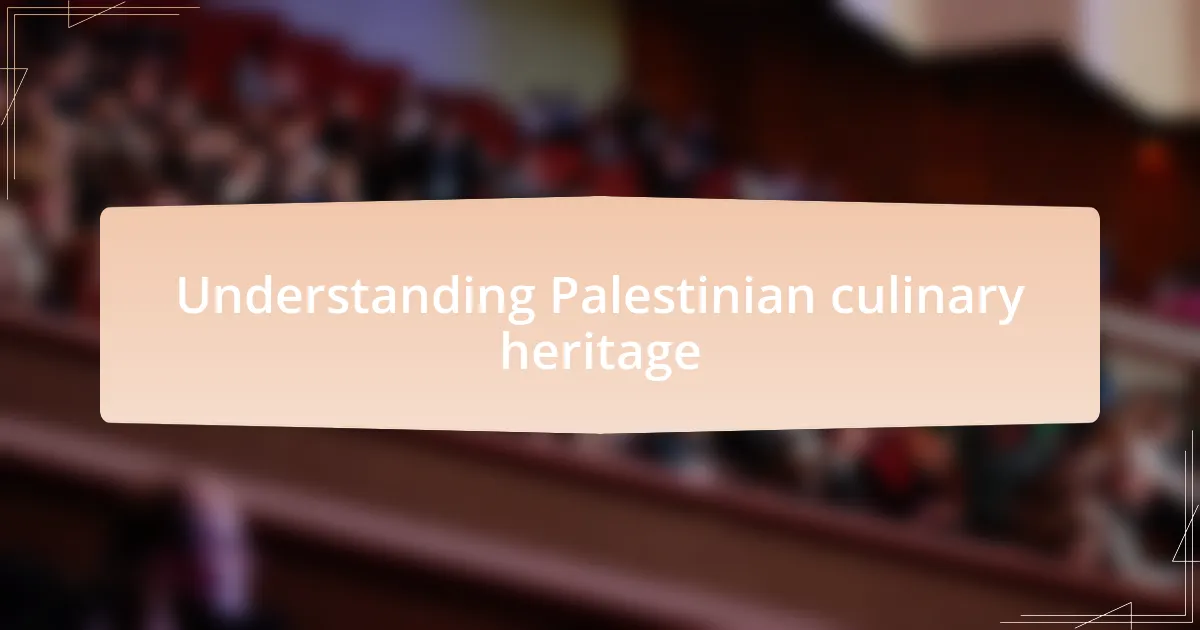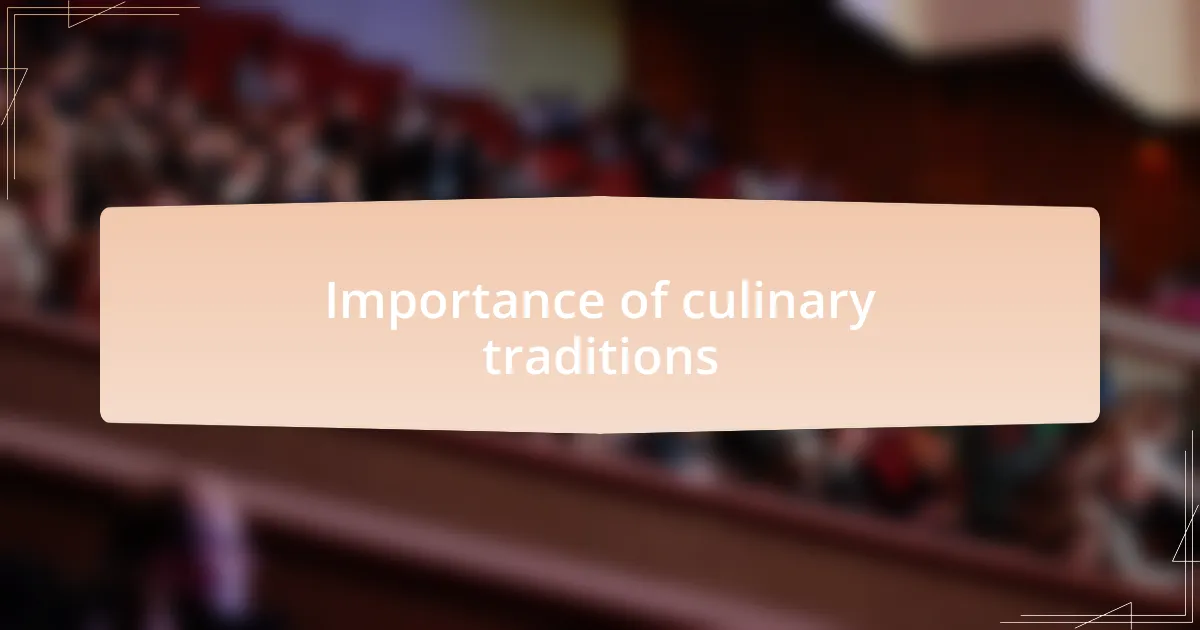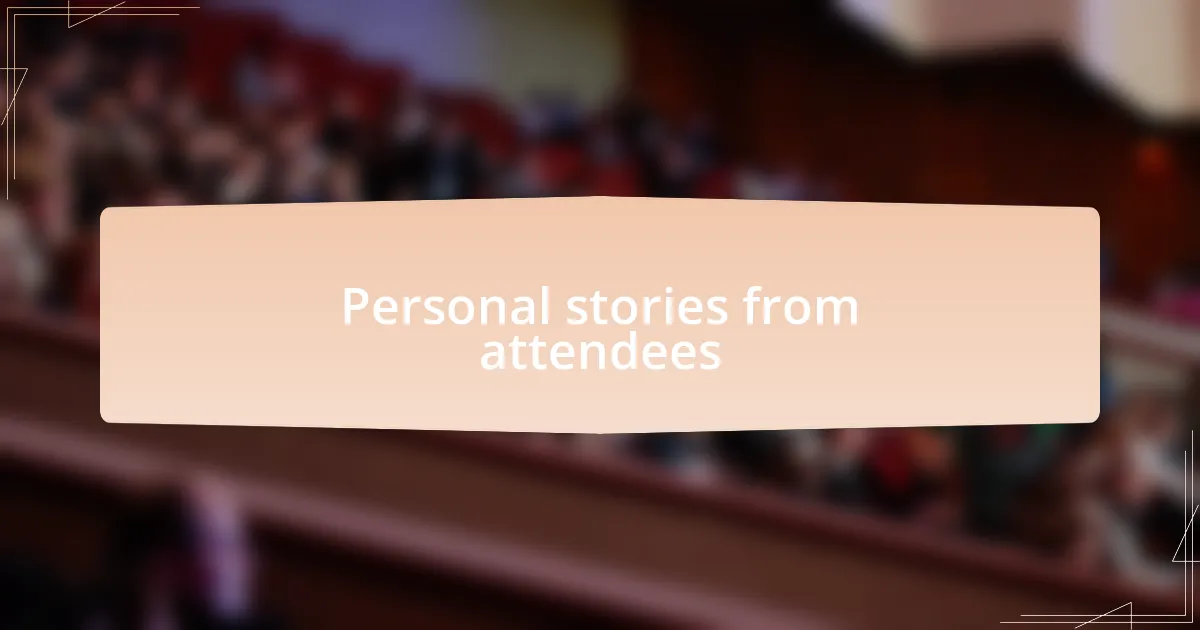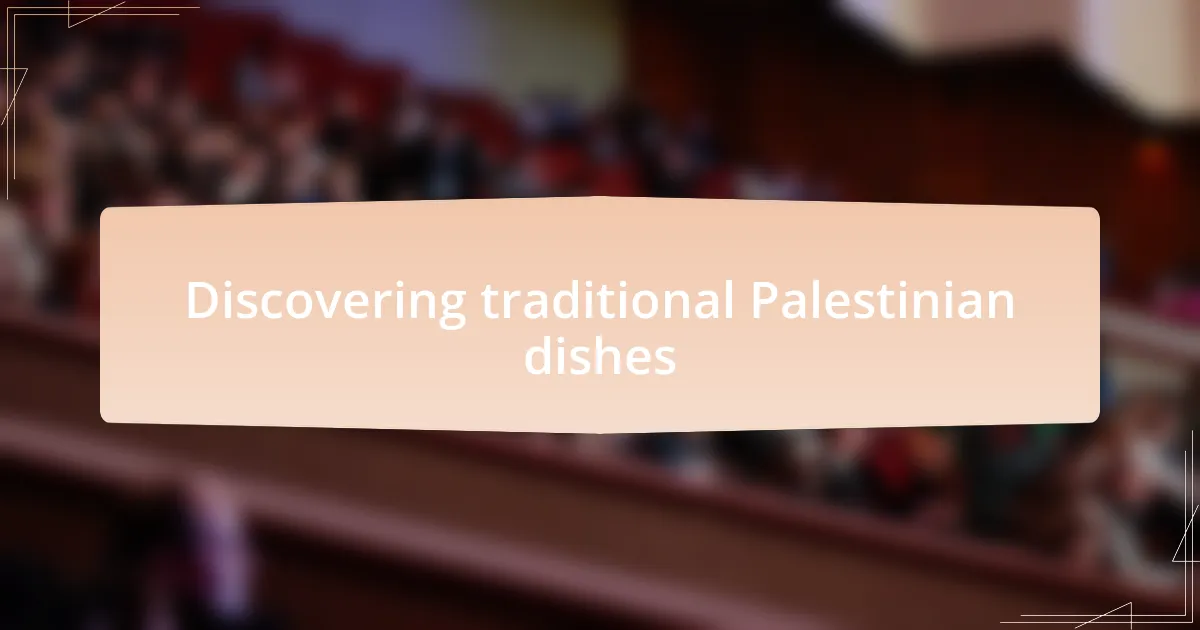Key takeaways:
- Palestinian culinary heritage is a reflection of community, identity, and resilience, with dishes like maklouba and musakhan embodying family stories and traditions.
- The act of sharing meals fosters connections and solidarity, emphasizing hospitality and the emotional weight of culinary practices in preserving culture.
- The Palestinian Conference highlights the importance of culinary traditions, bringing together stories, recipes, and the desire to pass on heritage to future generations.
- Personal stories from attendees reveal how cooking connects individuals to their roots and memories, showcasing the deep emotional impact of food in their lives.

Understanding Palestinian culinary heritage
Palestinian culinary heritage is a vibrant tapestry woven together from centuries of diverse influences and traditions. When I first tasted maklouba, a dish layered with rice, vegetables, and tender meat, I felt a profound connection to the land. It’s not just food; it tells the stories of family gatherings and celebrations that have shaped Palestinian identity over generations.
One of the most striking aspects of this heritage is how it embraces communal eating. I vividly recall a dinner where everyone shared from a large platter, each person adding their own stories and laughter to the meal. Isn’t it fascinating how food can create such bonds? This practice reflects the Palestinian spirit—where meals are not merely for sustenance, but a celebration of love, culture, and community.
As I explored various dishes, I was drawn to how spices play a crucial role in flavor and identity. Za’atar, for example, is more than a seasoning; it’s a symbol of homeland and resilience. It made me ponder: how often do we associate certain flavors with memories or emotions? In Palestinian cuisine, these connections run deep, reminding me that every bite carries the weight and warmth of history.

Importance of culinary traditions
Culinary traditions serve as a living archive of a culture’s history and values. I remember sharing a plate of maqluba with family, where each layer of ingredients mirrored the layers of our ancestral stories. It made me consider: can food be a bridge connecting the past to the present? In Palestinian culture, these culinary narratives foster a sense of belonging and identity among generations.
In every bite of traditional dishes, there’s an essence of resilience and creativity. When I tried making mujaddara for the first time, it was more than just a recipe; it felt like paying homage to the countless hands that had stirred, tasted, and perfected it over time. Doesn’t it strike you how recipes can hold the emotional weight of a people’s journey? This connection to culinary heritage not only preserves traditions but also imparts wisdom and a sense of solidarity.
Moreover, the act of preparing and sharing meals echoes the Palestinian spirit of hospitality and community. I once witnessed a neighbor inviting others to join her while preparing a feast for a local celebration. The bustling kitchen was vibrant with laughter and conversation. Isn’t it incredible how culinary traditions have the power to dissolve barriers and unite diverse voices around a single table? Through these meals, we not only nourish our bodies but also enrich our souls, binding us together in a shared experience of culture and love.

Overview of the Palestinian Conference
The Palestinian Conference serves as a vital platform for exploring the unique cultural tapestry of Palestine, bringing together scholars, artists, and culinary enthusiasts. I vividly recall attending a session where experts shared insights on how traditional Palestinian dishes are influenced by regional ingredients and historical trade routes. Isn’t it fascinating how a simple dish can encapsulate such a wide array of experiences and histories?
In discussions, I found myself immersed in the narratives that accompany classic recipes. One session featured poignant stories about how dishes like zaarour—wild thyme—are intertwined with memories of childhood and family gatherings. These personal stories resonate deeply, offering a glimpse into the heart of a community. Have you ever thought about the stories behind the food you cherish?
Moreover, the conferences emphasize the importance of preserving these culinary traditions for future generations. I remember engaging with participants who were passionate about teaching their children not just recipes, but the heritage that comes with them. It struck me how the act of sharing knowledge at such gatherings feels like a sacred duty, ensuring that the essence of Palestinian culinary heritage continues to thrive. How do we ensure that these valuable stories are not lost to time?

Highlights from the conference sessions
During one unforgettable session, a chef demonstrated how to make musakhan, a dish that sings of home and hospitality. The room was filled with the tantalizing aroma of roasted chicken, onions, and sumac, eliciting a wave of nostalgia. I couldn’t help but share how my grandmother used to prepare this dish every Friday, turning our home into a haven of warmth and laughter. Have you ever experienced a meal that felt like a warm embrace?
Another highlight was a roundtable discussion where participants passionately debated the role of food in cultural identity. One attendee shared their journey of discovering their roots through cooking traditional dishes, connecting with long-lost relatives who also cherished the same recipes. The emotion in their voice stirred something within me—food truly can bridge gaps and forge connections across generations. Does food not tell our stories in a way that words sometimes cannot?
The conference also hosted a workshop on crafting za’atar blends, emphasizing the significance of each herb and spice. Engaging in this hands-on experience brought back memories of my childhood, where I learned the importance of these flavors from my mother. It was not just about taste; it was about understanding our heritage through the very ingredients that shape our meals. What impact do these culinary practices have on our sense of belonging?

Personal stories from attendees
One attendee shared a heartwarming story about how her family would gather every year during Ramadan to prepare iftar together. As she reminisced about the laughter and camaraderie while rolling grape leaves and frying falafel, I could almost hear the echo of her family’s voices filling the kitchen. Isn’t it fascinating how food can create lasting memories and traditions that connect us with our loved ones?
Another conference participant recounted her experience of replicating her grandmother’s lamb dish for the first time. She spoke about the mix of excitement and anxiety she felt, worrying that it wouldn’t taste the same. When she finally took a bite, the flavors transported her back to her childhood, reminding me that cooking isn’t just about following a recipe; it’s about preserving a legacy and feeling a connection to our past. Can a meal truly revive lost moments in our lives?
One memorable story came from a young man who described his journey of rediscovering his cultural roots through the act of cooking. After moving abroad, he found solace in preparing traditional Palestinian meals, each bite a reminder of home. His words resonated with me because they highlighted the profound role food plays in our identities and how it can anchor us in uncertain times. Isn’t it remarkable how a simple dish can hold so much emotional weight?

Discovering traditional Palestinian dishes
When I first encountered musakhan, I was captivated by the layers of flavor it presented. The roasted chicken, sumac, and toasted pine nuts served on top of flatbread created a symphony that danced on my palate. As I savored each bite, I couldn’t help but wonder how this dish, rooted in tradition, carries stories from generations past. Have you ever tasted a dish that felt like a warm embrace?
One evening, while sharing a meal of maqluba with friends, I was struck by its presentation—a beautiful upside-down rice dish layered with spices, eggplants, and chicken. It was an artistic revelation as we flipped the pot onto the serving tray. This moment reminded me that food is not just about sustenance; it’s also about the joy of sharing and celebrating community. How often do our meals become a canvas for connection and belonging?
During my journey through Palestinian culinary heritage, I found myself enchanted by the simplicity of lentil soup, or shorbat adas. It’s comforting yet humble, made with just a few ingredients that showcase the essence of the land. As I sat with a bowl steaming in front of me, I reflected on how these traditional dishes often tell the stories of resilience and resourcefulness. Isn’t it incredible to think how a dish can encapsulate the spirit of a culture?